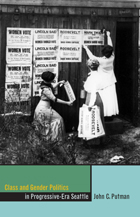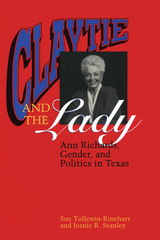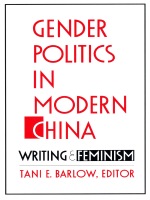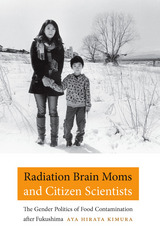

It was like a remake of The Cowboy and the Lady, except that this time they weren't friends. The 1990 Texas governor's race pitted Republican Clayton Williams, a politically conservative rancher and oil millionaire, against Democrat Ann Richards, an experienced progressive politician noted for her toughness and quick wit. Their differences offered voters a choice not only of policies and programs but also of stereotypes and myths of men's and women's proper roles.
Claytie and the Lady is the first in-depth look at how gender affected the 1990 governor's race. The authors' analysis reveals that Ann Richards' victory was a result of a unique combination of characteristics. She was simultaneously tough enough to convince voters that she could lead and feminine enough to put them at ease. At the same time, she remained committed to the progressive and women's issues that had won her the early support of feminists and progressives. The authors also show how Clayton Williams' appeal to the Texas cowboy myth backfired when he broke the cowboy code of chivalry to women.
The authors set their discussion within the historical context of twentieth-century Texas politics and the theoretical context of gender politics in order to pose a number of thought-provoking questions about the effects of women's participation in political life. Interviews with key players in the 1990 election, including Governor Ann Richards, add a lively and insightful counterpoint to the text.

With dramatic suddenness, the feminist movement emerged on the social scene in the late 1960s, and by 1980 it was a political force to be reckoned with. This ground-breaking study combs a wealth of public opinion surveys and census data to discover why women have become politically active and what it means to public policy. The book focuses on two compelling questions: What are the common concerns that mobilize women, and how do these concerns shape political activism?
Ethel Klein finds that a trend toward redefining women's lives has been present since the turn of the century. She examines the erosion of traditional patterns in women's roles brought about by rising divorce rates, fuller participation in the workforce, and longer lives. Klein argues that the elements required for revolutionary change--such as grievances, leaders, organization, and resources--were evident long before the 1960s. What was missing was a constituency to support feminist demands. She explores in detail how the public approval of women's rights finally caught up with the need for reform. As group consciousness grew, so did public support. The two factors coalesced in the rise of activism and a full-blown women's movement.
Klein tests her hypotheses on the elections of 1972, 1976, and 1980, with surprising results. She finds from election polls that men are no less feminist than women, but that women's support comes from group consciousness while men's comes from a liberal ideology. At the individual level she reveals how support of feminism affects people's political decisions--their approval of protest, their preference for collective forms of activism, and, when real alternatives are present, the votes they cast for President.



Ranging from interviews with contemporary writers, to historical accounts of gendered writing in Taiwan and semi-colonial China, to close feminist readings of individual authors, these essays confront the degree to which textual stategies construct notions of gender. Among the specific themes discussed are: how femininity is produced in texts by allocating women to domestic space; the extent to which textual production lies at the base of a changing, historically specific code of the feminine; the extent to which women in modern Chinese societies are products of literary canons; the ways in which the historical processes of gendering have operated in Chinese modernity vis à vis modernity in the West; the representation of feminists as avengers and as westernized women; and the meager recognition of feminism as a serious intellectual current and a large body of theory.
Originally published as a special issue of Modern Chinese Literature (Spring & Fall 1988), this expanded book represents some of the most compelling new work in post-Mao feminist scholarship and will appeal to all those concerned with understanding a revitalized feminism in the Chinese context.
Contributors. Carolyn Brown, Ching-kiu Stephen Chan, Sung-sheng Yvonne Chang, Yu-shih Chen, Rey Chow, Randy Kaplan, Richard King, Wolfgang Kubin, Wendy Larson, Lydia Liu, Seung-Yeun Daisy Ng, Jon Solomon, Meng Yue, Wang Zheng

READERS
Browse our collection.
PUBLISHERS
See BiblioVault's publisher services.
STUDENT SERVICES
Files for college accessibility offices.
UChicago Accessibility Resources
home | accessibility | search | about | contact us
BiblioVault ® 2001 - 2024
The University of Chicago Press









